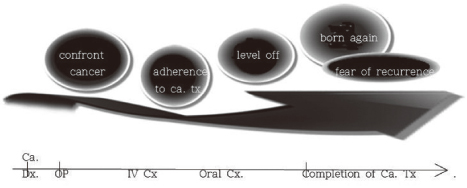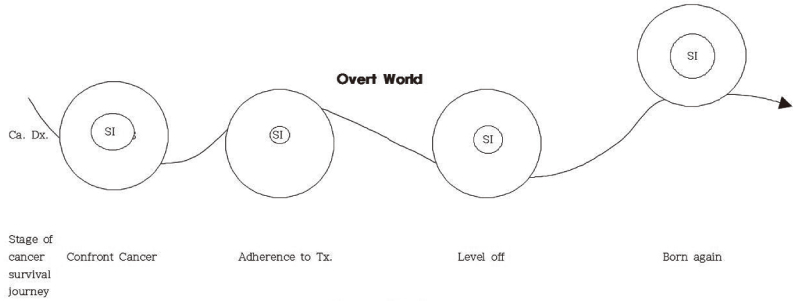Experience of Colorectal Cancer Survival Journeys: Born Again after Going Through an Altered Self Image
- Affiliations
-
- 1Department of Nursing, Doowon Technical University College, Anseong, Korea.
- 2Red Cross College of Nursing, Chung-Ang University, Seoul, Korea. kschoi@cau.ac.kr
- KMID: 2220757
- DOI: http://doi.org/10.5388/aon.2013.13.3.163
Abstract
- PURPOSE
This microethnographic study was performed to understand the survival experiences of patients after surgical resection of colorectal cancer.
METHODS
In-depth interviews of seven male and six female patients with colorectal cancer were conducted after being observed. Digital-audio recordings of the interviews were transcribed verbatim and then qualitatively analyzed.
RESULTS
The survival journeys of patients with colorectal cancer surgery were described as 'born again after going through an altered self-image'. This consists of 4 phases: 'Confrontation of the cancer diagnosis', 'Fierce compliance', 'Leveling off', and 'Born again'. Their self-images were significantly altered subsequent to confronting their cancer diagnosis. While they were in the phase of fierce compliance, patients were introverted from the outside world, but upon receiving help from a substantial supportive system including family, health professionals, peer patients, and religion, their internalized self-image was reinforced. This would significantly boost the patients' morale. Finally they felt born again with an emotional and spiritual self-image.
CONCLUSION
Nursing intervention should be differentiated and specified according to the specific phase of the long term colorectal cancer survival journey. Colorectal cancer patients should be provided with a specialized nursing program to improve their self-images.
MeSH Terms
Figure
Cited by 4 articles
-
Factors Influencing Quality of Sleep among Patients with Colorectal Cancer Receiving Chemotherapy
Hee Soon Jang, Eun Ok Choi
Asian Oncol Nurs. 2016;16(2):103-111. doi: 10.5388/aon.2016.16.2.103.Exercise Participation Experiences of Colorectal Cancer Survivors
Ji Yong Byeon, Mi Kyung Lee, Jae Youn Chung, Samuel Yoo, Justin Y. Jeon
Asian Oncol Nurs. 2019;19(2):98-105. doi: 10.5388/aon.2019.19.2.98.The Effectiveness of a Forest-experience-integration Intervention for Community Dwelling Cancer Patients’ Depression and Resilience
Yeon Hee Choi, Young Sun Ha
J Korean Acad Community Health Nurs. 2014;25(2):109-118. doi: 10.12799/jkachn.2014.25.2.109.Living with a Colostomy: A Phenomenological Study
Soo Young Jun, Yeoungsuk Song
Korean J Adult Nurs. 2017;29(6):579-586. doi: 10.7469/KJAN.2017.29.6.579.
Reference
-
1. National Cancer Information Center. Major cancer survival rate. Accessed March 26, 2013. http://www.cancer.go.kr/ncic/cics_f/03/032/index.html.2. Mullan F. Seasons of survival: reflections of a physician with cancer. N Engl J Med. 1985; 313:270–273.
Article3. Gusani NJ, Schubart JR, Wise J, Farace E, Green MJ, Jiang Y, et al. Cancer survivorship: a new challenge for surgical and medical oncologists. J Gen Intern Med. 2009; 24:S456–S458.
Article4. Jansen L, Koch L, Brenner H, Arndt V. Quality of life among long-term (≥ 5years) colorectal cancer survivors - Systemic review. Eur J Cancer. 2010; 46:2879–2888.
Article5. Pedro LW. Quality of life for long-term survivors of cancer. Cancer Nurs. 2001; 24:1–11.
Article6. Cotrim H. Impact of colorectal cancer on patient and family; Implication for care. Eur J Oncol Nurs. 2008; 12:217–226.7. Simon AE, Thompson MR, Flashman K, Wardle J. Disease stage and psychosocial outcomes in colorectal cancer. Colorectal Dis. 2009; 11:19–25.
Article8. Choi KS. Ethnographic case study of an experience of a patient with rectal cancer through oral history [dissertation]. Seoul: Seoul National Univ.;1995.9. Kim MS. Long-term survival experience of patients with rectal cancer [dissertation]. Seoul: Chung-Ang Univ.;1996.10. Kim HJ. Self-management of colorectal cancer patients, according to trajectory of disease [dissertation]. Seoul: Chung-Ang Univ.;2010.11. Agar MH. The Professional Stranger. Orlando: Academic Press Inc;1980.12. Roper JM, Shapira J. Ethnography in nursing research: methods in nursing research. New York: Sage Publications Inc;2000.13. Field AP, Morse JM. Nursing research the application qualitative approaches. London: Croom Helm;1985.14. CDC, Lance Armstrong Foundation. National Action Plan for Cancer Survivorship: Advancing Public Health Strategies. Accessed June 20, 2012. http://www.cdc.gov/cancersurvivorship/what_cdc_is_doing/act.15. Gao J, Don S, Dizon DS. Preparing for survivorship: quality of life in breast cancer survivors. J Sex Med. 2013; 10:16–20.
Article16. Wikipedia. Self-image. Accessed March 25, 2013. http://en.wikipedia.org/wiki/Self-image.17. Niiya Y, Crocker J, Mischkowski D. Compassionate and self-image goals in the united states and Japan. J Cross Cult Psychol. 2013; 44:389–405.
Article18. Choi KS, Jun MH, Anderson G. Experiences of Korean-American women with high risk hereditary breast cancer. Asian Oncol Nurs. 2012; 12:175–185.
Article19. Park MS, Kim KS. Cancer survivors' life experience. J Korean Oncol Nurs. 2008; 8:93–104.20. Wyatt G, Friedman LL. Long-term female cancer survivors: quality of life issues and clinical implications. Cancer Nurs. 1996; 19:1–7.
Article21. Baik OM, Lim JW. Social support in Korean breast and gynecological cancer survivors: comparison by the cancer stage at diagnosis and the stage of cancer survivorship. Korean J Fam Welf. 2011; 32:5–35.22. Lim JW, Han IY. Comparison of quality of life on the stage of cancer survivorship for breast and gynecological cancer survivors. Korean J Soc Welf. 2008; 60:5–27.
Article23. Mahon SM. Tertiary prevention: implications for improving the quality of life of long-term survivors of cancer. Semin Oncol Nurs. 2005; 21:260–270.
Article24. Lee GJ, Lee JN, Oh JH, Baek JH. Mid-term results of laparoscopic surgery and open surgery for radical treatment of colorectal cancer. J Korean Soc Coloproctol. 2008; 24:373–379.
Article25. Friedman G, Florian V, Zernitsky-Shurka E. The experience of loneliness among young adult cancer patients. J Psychosoc Oncol. 1989; 7:1–15.
Article26. Sekse RJ, Raaheim M, Blaaka G, Gjengedal E. Life beyond cancer: women's experiences 5 years after treatment for gynecological cancer. Scand J Caring Sci. 2010; 24:799–807.
Article27. Corrigan PW, Kosyluk K, Rusch N. Reducing self-stigma by coming out proud. Am J Public Health. 2013; 103:794–800.
Article28. Mizuno M, Kakuta M, Ono Y, Kato A, Inoue Y. Experiences of Japanese patients with colorectal cancer during the first six months after surgery. Oncol Nurs Forum. 2007; 34:869–876.
Article29. Au TY, Zauszniewski JA, King TM. Health-seeking behaviors and sexuality in rectal cancer survivors in taiwan: associations with spirituality and resourcefulness. Oncol Nurs Forum. 2012; 39:E390–E397.
Article30. Maxwell A, Jo A, Crespi C, Sudan M, Bastani R. Peer navigation improves diagnostic follow-up after breast cancer screening among Korean American women: results of a randomized trial. Cancer Causes Control. 2010; 21:1931–1940.
Article
- Full Text Links
- Actions
-
Cited
- CITED
-
- Close
- Share
- Similar articles
-
- Obesity and Colorectal Cancer
- Reply on "Data on the Characteristics and the Survival of Korean Patients With Colorectal Cancer From the Korea Central Cancer Registry"
- Commentary on "Data on the Characteristics and the Survival of Korean Patients With Colorectal Cancer From the Korea Central Cancer Registry"
- Current Status of Chemotherapy in Colorectal Cancer: Updated Treatment Strategies
- Outcomes of Hepatic Resection for Colorectal Cancer Liver Metastasis



